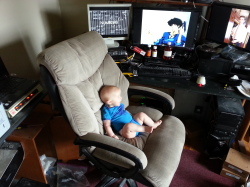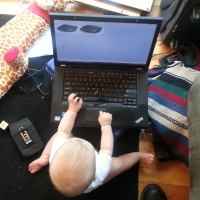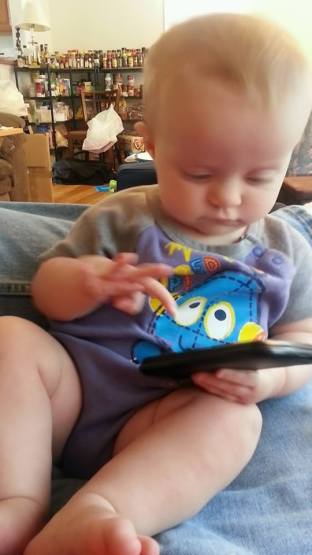James Joyner and Allison Slater Tate write about parenting as a Generation X’er, mostly in the context of being the last generation raised in the pre-Internet era:
It struck me recently, after one of my quiet carpool rides, that my generation of parents – we of the soon-to-be or recently 40 year old Gen X variety, the former latchkey children of the Cold War and an MTV that actually played videos, former Atari-owners who were raised by the the Cosby Show and John Hughes, graduated high school with the kids from 90210, then lumbered through our 20s with Rachel, Ross, Chandler, Monica, Phoebe, and Joey and flip phones – is perhaps the last to straddle a life experience both with and without the Internet and all its social media marvels. After all, I didn’t even learn to use e-mail until I was 19 and a sophomore in college in 1993, and only for a slightly cringe-worthy reason: a cute boy at another college asked me to e-mail him.
My generation, it seems, had the last of the truly low-tech childhoods, and now we are among the first of the truly high-tech parents.
 My formative years were truly right on the cusp of the Internet age, falling just before it. I didn’t have reliable, worthwhile Internet access until I got to Southern Tech. I did have BBSes, of course, which mattered a great deal at the time as I got to experience some of the social aspect of the Internet.
My formative years were truly right on the cusp of the Internet age, falling just before it. I didn’t have reliable, worthwhile Internet access until I got to Southern Tech. I did have BBSes, of course, which mattered a great deal at the time as I got to experience some of the social aspect of the Internet.
What I didn’t get to experience, though, was everything else. Some of which will actually be kind of hard to convey to Lain and future siblings. Much of the awesomeness of the Internet involves relatively small shifts between things that were already occurring. Before there was online shopping, there was mail order.  And Lain will shop.
And Lain will shop.
The truly big thing that the Internet brought is having a world of fact at our fingertips. It’s possible, and true, to talk about how the Internet has allowed us to live in fact-starved cocoons where the reality of politics, science, and religion is more or less choose-your-own-adventure, but scratch just below that surface and ponder how amazing it is to want to know something and be able to pretty immediately look it up the vast majority of the time. Remember what life was like before that? It was like this:
Argument About Capital Of Australia Occurs 10 Feet From Encyclopedia
ORD, NE— Brothers Jeff and Adam Clink spent 20 minutes fiercely debating the capital of Australia while standing 10 feet from the family’s World Book encyclopedia Monday. “You’re high,” Jeff, 18, told Adam. “It’s Sydney.” Adam, who said he is “99.99 percent sure” that Melbourne is the capital, conceded that one city might be the capital of the Australian continent and the other the capital of the nation.
 It’s not that you couldn’t get the answers to such things. It’s that you rarely did, if it wasn’t particularly important. One of my favorite phrases is “There’s no reason not to know when you’re holding a smartphone” and I will frequently look up points of uncertainty in the middle of group conversations. Or if someone says something that sounds not quite right, I can look it up and correct later.
It’s not that you couldn’t get the answers to such things. It’s that you rarely did, if it wasn’t particularly important. One of my favorite phrases is “There’s no reason not to know when you’re holding a smartphone” and I will frequently look up points of uncertainty in the middle of group conversations. Or if someone says something that sounds not quite right, I can look it up and correct later.
And Lain will, of course, take that almost entirely for granted. And it’ll be hard to explain how it used to be that if someone was bullspitting around, you more or less had to either shrug it off or debate it to a lack of conclusion. Like the capital of Australia was a choose-your-own-adventure political disagreement.
Of course, some of the changes are a bit disconcerting. I’d more or less figured out how we were going to handle kids and TV time. I figured this out before it became apparent that ultimately they’d be watching TV on their phones. Now I’m back to square one, without a clue as to what to do. It used to be a simple matter of not allowing them to have a TV in their bedroom, or a video game console in their bedroom or in the house. Now? Well, it’s hard to make it so that they have a world of information at their fingertips and not the ability to watch their favorite TV show.
And at some point, they won’t even need a device because it’ll be in their contact lens. But that’s a problem Lain will have to deal with if she has children.
About the Author
3 Responses to Year 20 Anno Internet
Leave a Reply
please enter your email address on this page.

I was in grad school (about 20) when I first had e-mail, and even then it was just the very basic, text-based (we had the old orange text on black screen Zeniths). I think it was ’94 or ’95 when I first saw webpages. (I feel old, now).
I will say that I tend to be more of a Luddite about stuff than some folks older than I am. I blog, but I don’t Facebook/LinkedIn/Instagram/Vine/whatever. I get actively annoyed at people who won’t look up from their cell phones to engage in actual life (and won’t stay trying to talk to someone who’s trying to multitask by updating their FB page while trying to talk to me).
I will say, in my work, it is SO MUCH BETTER now in terms of finding scientific journals – a few clicks and I have what I need, unlike the hours spent searching “Biological Abstracts” as a student.
And in my hobbies: I might not pursue them as avidly if I didn’t have online sources of free patterns, places to buy fabric and yarn, and a community of people I communicate with who are interested in the same stuff as I am.
Even as much as the whole Facebook drama stuff makes me roll my eyes, and even as much as I am a refusenik about some of the online stuff, still, on balance, the Internet has improved my life.
Your hobbies reminds me of something I didn’t really get into, but which is important: the ability to find commercial art. I have every issue of Impact Comics except one. At the time, I just couldn’t get it. Now I can get on eBay and it’s there for $2 (I need to go buy it).
The notion of “limited release” is hard to accomplish.
You know you’re getting old if you can remember having to go to a skanky theater to watch dirty movies.